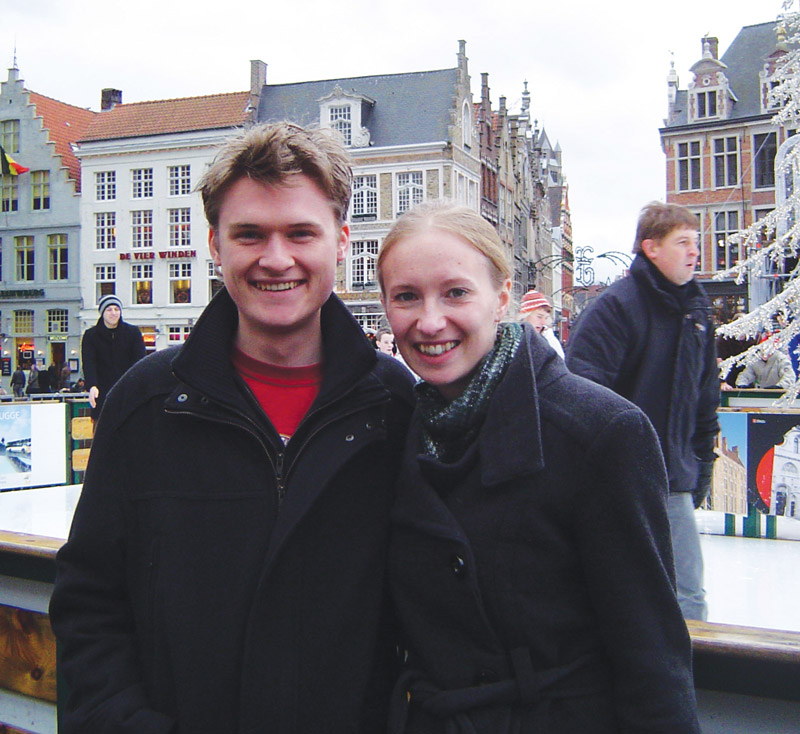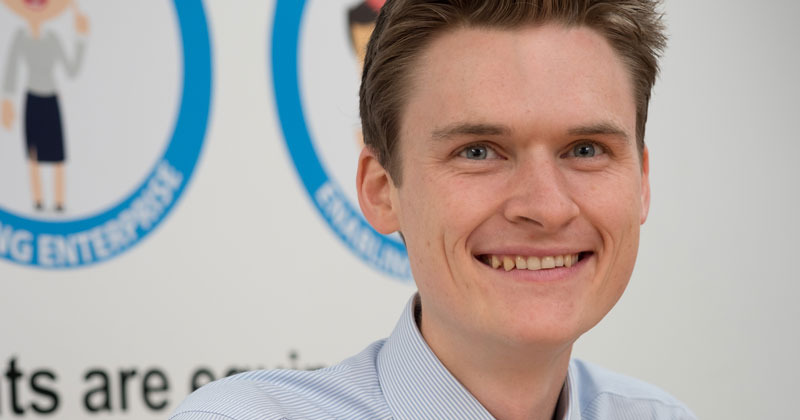Tom Ravenscroft is perhaps the most quietly passionate proponent of a “skills” curriculum in education today – and if that rings alarm bells, keep reading.
He was just nine years old when he set up a little production line making greeting cards. His mum, a speech and language therapist, suggested he sell them at village fetes, which he did. At 11, he offered his services as a car washer around his town of Marlowe in Buckinghamshire, soon “rebranding as a car valet” to charge a bit more. In the same year, Ravenscroft’s father, an auditor with BP, helped him decide which secondary school to choose by listing his key criteria, such as “IT equipment” and showing him how to weight them mathematically. A five-mile run was treated with similar foresight, with goals worked backwards over several months.
The fruits of his parents’ support, and discussions at dinner with three bright brothers, are clear when you meet Ravenscroft, a former teacher who now runs a social enterprise working with schools. It’s not only that at Oxford he made a four-month plan for his finals, “actually stuck to it” and got a first, but that after training as a teacher for two years, he has committed the last decade to designing a formal framework for teaching what he learnt – how to plan, listen, persuade – to all pupils.
I’d be there, pulling my hair out, wondering why they couldn’t get on with each other when I asked them to do something simple
It’s called Enabling Enterprise, and he has finally put its principles in a book (“written mostly during my commute”) published this week. At his core is a belief that grew “like a hunger” while teaching year 10 pupils in Hackney as a BTEC business studies teacher – to teach them the skills they needed to access the curriculum properly.
“I’d set them to a task, and then I’d be there, pulling my hair out, wondering why they couldn’t get on with each other when I asked them to do something simple in the corner,” he admits.
The group got a full lesson on teamwork, including how to allocate roles, such as a facilitator, a note-taker and a time-keeper. Group work became civilised, and assignments to design business meetings were thoughtful. Next was how to stand up and present. More lessons were added, delivered in curriculum time over the year, to form the four key principles Ravenscroft describes now: presenting, listening and understanding; working in a team without falling out and leading others well; solving a problem and thinking creatively; and the self-management to aim for something and not give up when the going gets tough.

“By the end of the year, every single kid – no exceptions – was standing up and giving formal presentations about their businesses,” he says. He soon began to feel less “completely panicked” that his pupils would not get jobs.
But haven’t we heard it all before? The public is immune to the CBI saying, for the umpteenth time, that graduates need better skills – they still get jobs, don’t they? We already have the Careers and Enterprise Company, Business in the Community, Young Enterprise and many more rabbiting on about it, and it’s too late, anyway: “skills” has become an increasingly embarrassing word, a throwback to Sir Ken Robinson and the Blair years.
Nowadays the Department for Education is run by believers in the knowledge-rich, traditional curriculum. Apprenticeships and further education cover the “skills” question, separate to the work of schools.
Perhaps, says Ravenscroft, but the skills debate has been a “mess”, according to his book – with buzzwords like “business skills”, “soft skills” and worse still, “21st century skills”, muddying the waters – resulting in “confusion” and “misconceptions” among teachers.
He has now developed a Skills-Builder framework, which leads schools through each of the four key skills step by step, with his book as a practical manual. At primary school, it looks like this: one lesson a week, focused on a specific skill, such as presenting. Each lesson works towards a long-term project, such as creating a radio show. There is also a day spent with an impressive local employer, and a “challenge day”; a favourite of his is running an election.

At secondary school, 10-minute sessions are delivered in form time, again with an employer day and a challenge day. By starting early, and measuring the outcomes tightly, “you apply a mastery approach to building these skills”, he claims. His book is “the academic underpinning for why this is a sensible approach”.
As might be apparent from the fact he spent his boyhood savings on the sensible choice of car insurance while still a teenager, this 31-year-old values order and uses the word “rigour” so often in our interview he wryly notes my article will have it throughout. In short, everything about him screams the kind of methodical approach more commonly associated with knowledge-based or direct instruction advocates than with so-called ‘progressives’.
Ravenscroft and his team of formerly ‘outstanding’ teachers train staff on exactly how to deliver the lessons, and have a vision of a “master skills teacher” in every school.
Skills lessons should not be mixed with curriculum content: one hour a week is enough. And they want measurable outcomes, wherein Ofsted checks they are being taught. Sitting there exuding contented self-control, Ravenscroft is also well placed to be this voice – he was schooled at the Royal Grammar School in High Wycombe and then Oxford.
It “frustrates the hell out of him” that his system is not in more schools
But his drive for grades in Hackney was not producing the kinds of boys he and his brothers had become through their parents – his pupils only grew as self-confident when he gave dedicated time to building those “habits”, as he also calls them. For him, education should impart a holy trinity: knowledge, character and skills, and the last of these should not be neglected.
This may be, but Ravenscroft gives over a whole chapter to two obstacles in his path: the rubbish past initiatives he has to disprove, and teachers’ ideological opposition. One headteacher asked him if this was the latest “trendy, progressive fad”. The “ideological battleground” of English education, he says, has long been divided into the view that knowledge is the “bedrock” for developing skills and the progressive view, which claims education should develop aptitude. He identifies Daisy Christodolou, who wrote Seven Myths About Education, as a flag-bearer of the former, but if you want to know what Ravenscroft is really about, the heading that ends the chapter reads “Bringing the two together”.
But even with 85,000 pupils working with Enabling Enterprise this year, and 3,500 teachers trained last year, those barriers have made themselves felt: after 10 years, just 300 schools are signed on, or 1.2 per cent of the country’s total. Moreover, 10-minute sessions in PSHE cannot have the same impact as he did in Hackney, when he was a dedicated teacher delivering whole lessons for his class. While Ravenscroft disputes this, the numbers do hurt.
“I have mixed feelings,” he confesses, adding that it “frustrates the hell out of him” that his system is not in more schools. For someone so able to achieve his own goals, whether it’s a five-mile run or a social enterprise, having to wait is hard.
But with a book coming, free video sessions now available for teachers, and work beginning with the Careers and Enterprise Company, Ravenscroft says his team is about to “make a breakthrough fast”. Are they on the cusp? “Yes.”

So the skills debate is back on the table, but this time with a stricter master. If the knowledge-rich schools get on board, and some already are, the face of English education could quietly, radically rebalance after decades of “polarisation”. And you never know, he might finally even sort out careers guidance – so there’s an incentive.
It’s a personal thing
What is your favourite film?
The movie that stuck with me the longest was Inception. I think particularly because I was at the end of Christmas Day and I had had some wine and it just blew my mind! “What if this is all a dream…”
If you were on a desert island, what would you take?
I’d have to take a massive photo album with me, of family and friends, if I’m marooned from them.
Who are your family?
I’ve got a three-year-old son, and our second boy is due in January. I got married just over five years ago – Charlotte and I met at university, in the second term, and had our wedding at the college! My parents are from south Wales. My brothers have good solid Welsh names: Rhys, Dafydd and Harry.
What’s your favourite book?
The best book I ever read – it’s the geekiest thing – I read this 1,000 page book about the 1988 US presidential election called What it takes: The way to the White House. It was fascinating because it followed the nominees for the Democratic and Republican race, and you felt like you knew them. The book was basically asking, who are these people who think they should be the leader of the free world?
Who do you admire?
A real mix of people, but I think Brett Wigdortz at Teach First, who really stuck with it to build the organisation even though it was tough. Somebody like Wendy Kopp who runs Teach For All [a global network of non-profit groups to expand education opportunities] for about 25 years, who has been hacking away at the same problem.
What is your earliest memory?
I can remember going to the airport when we flew off to live in Japan for a year and half when I was about five years old. I definitely remember being in Japanese kindergarten and basically making a break for it out of the classroom, and consciously thinking “I’ll pretend I didn’t hear them”, and just running. I remember that vividly. Knowing that I was being naughty but I was going to get away with it.














Your thoughts